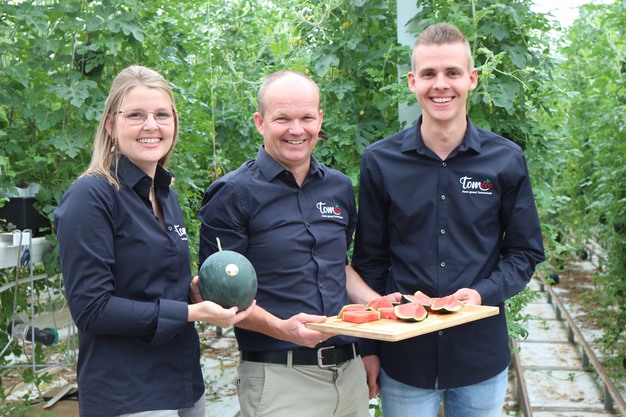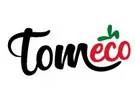The Tomélon season, the mini watermelon grown by Tomeco and marketed through Coöperatie Hoogstraten, is slowly coming to an end. "We are satisfied with how the season has gone. Through good agreements with our customers, we have been able to absorb the peaks in production well through planned actions. This way, consumers became more familiar with the product, and we were able to use our production peaks positively," says Franky Van Looveren of Tomeco.
 © Tomeco
© Tomeco
Tomélon's season runs roughly from early June to mid-September. "So we are on the shelves for about 2.5 to 3 months. This is a deliberately chosen strategy, where we aim for a longer presence in Belgian retail," he explains. "If a product is only available for 1 or 2 weeks, that is simply too short to build a brand. It is also important for consumers that, if they are enthusiastic, they can buy the product again. That it doesn't disappear if they come back for a repeat purchase or have to wait another year. Then you lose the momentum. With that in mind, about five years ago, we also started looking at the possibilities with our retail partners. Together, we came to the realisation that we wanted to offer continuity in supply throughout the summer period. I think we certainly succeeded in this with the Tomélon concept."
Less weather-dependent demand
So this year, the season is coming to an end. "The plants are not setting much fruit anymore, and demand is also decreasing. Melon sales are obviously very weather-dependent. When the weather is nice, they are hardly available, but when the weather is worse, that demand can also completely turn around. It is also the reason we have set up cultivation in such a way that it is ready as soon as demand weakens. After September, products like pumpkins and grapes take their place on the shop shelves again. Yet it is noticeable that the Tomélon consistently performs well. Demand appears to depend less on the weather than the demand for import supply does. We also hear this from retailers."
 © Tomeco
© Tomeco
What is the reason for this? "That's hard to say, but we regularly get feedback that consumers like the smaller, manageable size combined with local, sustainable cultivation. That is also exactly what we are focusing on. A local, sustainable, and tasty alternative to imported products, where we are not competing directly, but are active in the same sales period. Our melons are a bit more expensive than the imported ones, but there is a clear added value in return. Not only in terms of sustainability, but also in terms of taste and size. The smaller melon makes it more accessible and attractive to consumers."
Sustainable and manageable growth
Looking to the future, Franky therefore sees plenty of opportunities to possibly scale up. "Some Belgian retailers are showing additional interest, and we want to see if there are also opportunities abroad, such as Germany or the Netherlands. Every year, we do get requests from those countries. In Germany, however, 'local origin' plays a strong role, but if the product can differentiate itself on taste and quality, we see opportunities there too. This will probably start on a small scale, as we did in Belgium. So a tailor-made project with a specific retailer, to see whether consumers are willing to pay a bit more for a small, tasty melon. We also have connections there, and in the Netherlands, through our tomato cultivation, so Tomeco is already known there. So we can possibly enter those markets naturally with watermelons as well."
 © Tomeco
© Tomeco
"We are also looking internally at automation," he continues. "Sorting by size is still labour-intensive now. To reduce labour costs, we want to partly automate that process. At the same time, we continue to test other varieties and work with seed companies to further optimise the cultivation system. We realise, for instance, that in order to continue growing for even longer, new genetics are needed that are better suited to our system. That is a route we want to explore further with seed companies. These are longer-term projects, but we strongly believe in the potential."
"We started small. We quietly built up the concept, which has resulted in a really good working system. Now the key is to build that further without going too fast. Growth must remain sustainable and manageable, for us and for the retailer. Ultimately, it has to be a win-win. Both for us as a grower and for the retailer. Only then will you build a long-term sustainable partnership," Franky concludes.
For more information:
Franky Van Looveren
Tomeco
+32 3 284 16 84
[email protected]
www.feelgoodtomatoes.com
